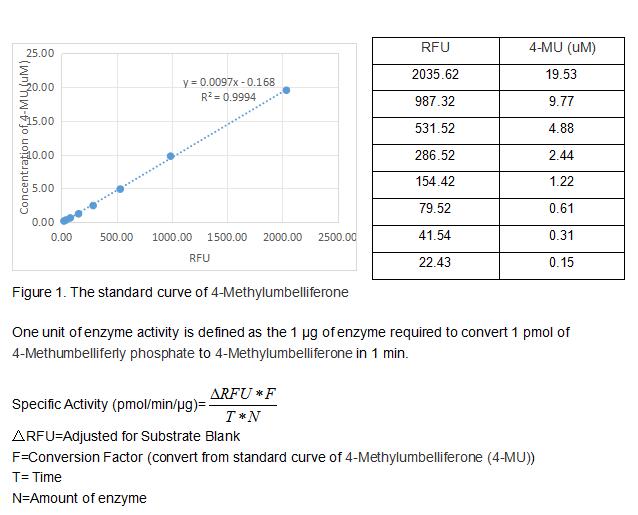Active Alkaline Phosphatase, Tissue-nonspecific (ALPL)
BALP; BSAP; HOPS; AP-TNAP; TNSALP; Bone Alkaline Phosphatase; Alkaline Phosphatase,Tissue-Nonspecific Isozyme; Alkaline Phosphatase, Liver/Bone/Kidney
- Product No.APB091Hu61
- Organism SpeciesHomo sapiens (Human) Same name, Different species.
- Buffer FormulationPBS, pH7.4, containing 5% Trehalose.
- TraitsFreeze-dried powder
- Purity> 90%
- Isoelectric Point6.7
- ApplicationsCell culture; Activity Assays.
- Download Instruction Manual
- UOM 10µg50µg 200µg 1mg 5mg
-
FOB
US$ 302
For more details, please contact local distributors!US$ 756
For more details, please contact local distributors! US$ 1512
For more details, please contact local distributors! US$ 4536
For more details, please contact local distributors! US$ 11340
For more details, please contact local distributors!
ACTIVITY TEST of the Active Alkaline Phosphatase, Tissue-nonspecific (ALPL)

Four distinct genes encode alkaline phosphatases (APs) in humans. The ALPL gene encodes the liver/bone/kidney isozyme, also known as the tissue nonspecific AP (TNAP). In comparison, ALPI, ALPP and ALPPL2 encode intestinal, placental and placental-like or germ cell APs, respectively. The serum levels of human APs are useful tumor markers. There are many mutations in the ALPL gene, leading to different forms of hypophosphatasia, characterized by poorly mineralized cartilage and bones. The native ALPL is a glycosylated homodimer attached to the membrane through a GPI-anchor. The activity assay of recombinant human ALPL was measured by its ability to cleave a peptide substrate, 4-Methumbelliferly phosphate. The reaction was performed in 50 mM Tris, 1 mM MgCl2, pH 9.0 ( assay buffer), ainitiated by addition 50 μL of 0.625 ug/ml ALPL (diluted by assay buffer) to 50 µL of 50 uM substrate. Read at excitation and emission wavelengths of 365 nm and 445 nm (top read), respectively, in kinetic mode for 5 minutes. The specific activity of recombinant human ALPL is >11000 pmol/min/µg.
USAGE of the Active Alkaline Phosphatase, Tissue-nonspecific (ALPL)
Reconstitute in 10mM PBS (pH7.4) to a concentration of 0.1-1.0 mg/mL. Do not vortex.
STORAGE of the Active Alkaline Phosphatase, Tissue-nonspecific (ALPL)
Avoid repeated freeze/thaw cycles. Store at 2-8°C for one month. Aliquot and store at -80°C for 12 months.
STABILITY of the Active Alkaline Phosphatase, Tissue-nonspecific (ALPL)
The thermal stability is described by the loss rate. The loss rate was determined by accelerated thermal degradation test, that is, incubate the protein at 37°C for 48h, and no obvious degradation and precipitation were observed. The loss rate is less than 5% within the expiration date under appropriate storage condition.
INCREMENT SERVICES
BCA Protein Quantification Kit
Molecular Mass Marker for Protein
Monoclonal Antibody Customized Service
Polyclonal Antibody Customized Service
Protein Activity Test Experiment Service
Electrophoretic Mobility Shift Assay (EMSA) Experiment Service
Buffer
Lentivirus Packaging Experiment Service
Adenovirus Packaging Experiment Service
Real Time PCR Experimental Service
Spike RBD Protein (S-RBD)
Protein G
Protein A

